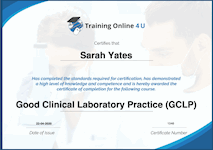Good Clinical Laboratory Practice (GCLP)
GCLP guidance identifies the systems required and procedures to be followed within an organisation.
Trainingonline4U Ltd
Summary
- Certificate of completion - Free
- Exam(s) / assessment(s) is included in price
Add to basket or enquire
Overview
Good Clinical Laboratory Practice (GCLP) was first drafted and published in 2003. Then, in 2006 the World Health Organisation (WHO) published GCLP guidance on its website as the standard for laboratories undertaking samples from Clinical Trials.
GCLP guidance identifies the systems required and procedures to be followed within an organisation which conducts analyses of samples from Clinical Trials in compliance with the requirements of Good Clinical Practice (GCP).
This interactive and engaging GCLP course provides Sponsors, laboratory management, project managers, CRAs and quality assurance personnel with an understanding of the framework for a quality system in the analysis of Clinical Trial samples. It will ensure that all laboratory processes and results are GCLP compliant.
CPD
Course media
Resources
- GCLP information leaflet - download
Description
Introduction to GLP
-
What is GCLP?
-
How is GCLP different to GCP and GLP?
-
How did the GCLP guidelines become established?
-
Who needs GCLP?
Chapter 1 - General Provisions
-
Common Definitions Referred to in GCLP
-
Raw Data and its Role in GCLP
-
Introduction to the Principles of GCLP
Chapter 2 - Principles of GCLP
-
Facilities, Organisations and Personnel
-
SOPs
-
Planning and Conduct of the Work
-
Reporting
-
Equipment and Computerised Systems
-
Quality Control
-
Storage and Retention of Records
-
Confidentiality, Blinding and Participant Safety
Chapter 3 - Implementation of GCLP
-
Clinical Trial Protocol
-
Writing an Analytical Plan
-
Sample Collection, Transportation, Reception and Analysis
-
Reporting Methods
-
Archiving
Chapter 4 - Summary
-
Course Summary
- Course Exam
Who is this course for?
Anyone working in a laboratory taking part in clinical research trials.
Career path
This interactive and engaging GCLP course provides Sponsors, laboratory management, project managers, CRAs and quality assurance personnel with an understanding of the framework for a quality system in the analysis of clinical trial samples. It will ensure that all laboratory processes and results are GCLP compliant.
Questions and answers
Hello dear In this course will I learn to develop new vaccines cures drugs please?
Answer:Dear Costa, Thank you for your enquiry. Our Good Clinical Laboratory Practice (GCLP) course will enable you to adhere to the standards laboratories need to follow if they perform analysis or evaluation of clinical trial samples. This ensures the analysis of samples from clinical trials by laboratories is ethical, reliable and can accurately be used to support the findings of that trial. The development of new vaccines is something that would be covered by a medical or life-sciences degree.
This was helpful.
Certificates
Certificate of completion
Digital certificate - Included
Reviews
Currently there are no reviews for this course. Be the first to leave a review.
Legal information
This course is advertised on reed.co.uk by the Course Provider, whose terms and conditions apply. Purchases are made directly from the Course Provider, and as such, content and materials are supplied by the Course Provider directly. Reed is acting as agent and not reseller in relation to this course. Reed's only responsibility is to facilitate your payment for the course. It is your responsibility to review and agree to the Course Provider's terms and conditions and satisfy yourself as to the suitability of the course you intend to purchase. Reed will not have any responsibility for the content of the course and/or associated materials.


